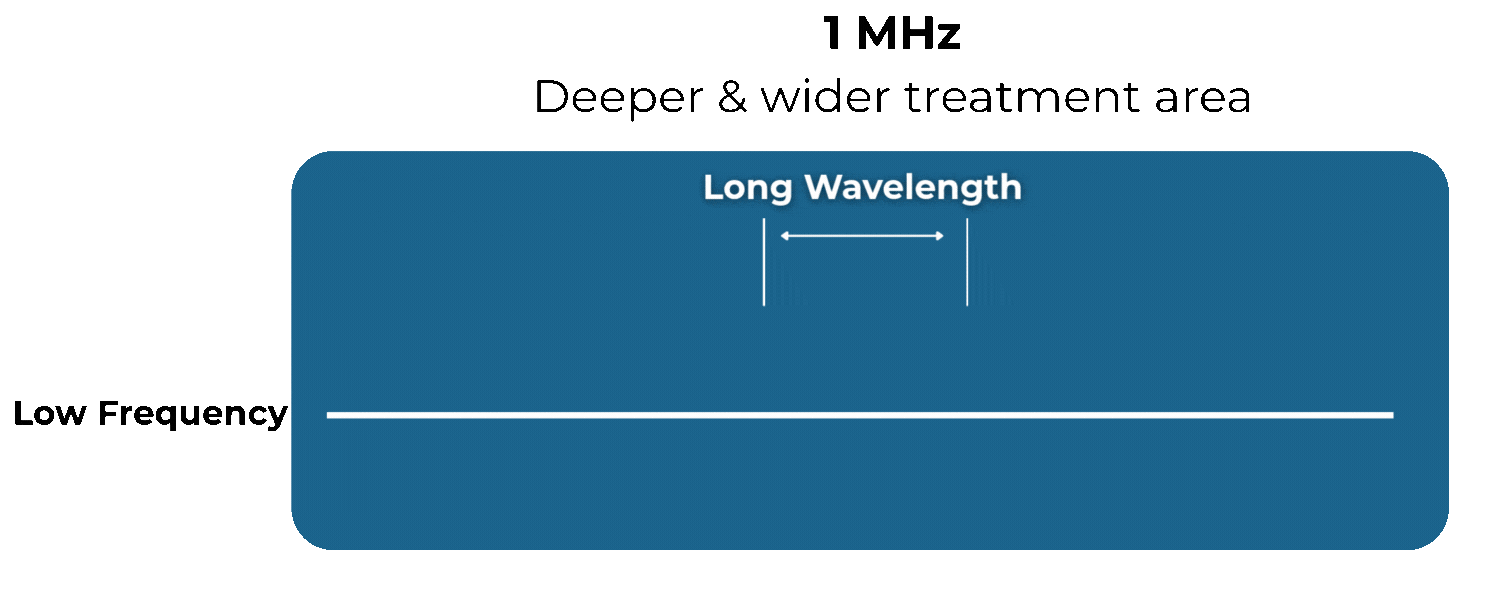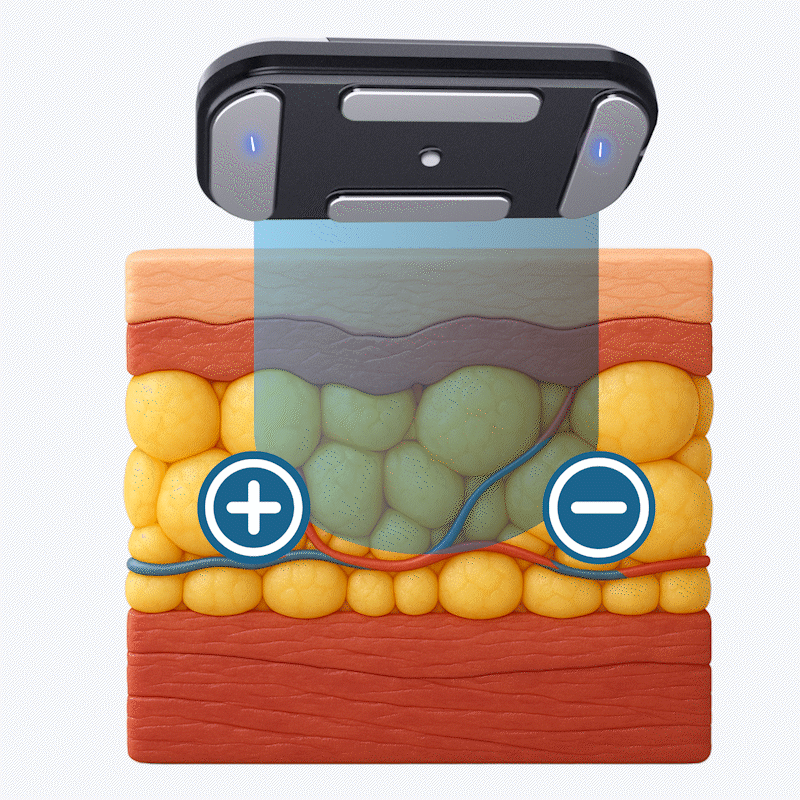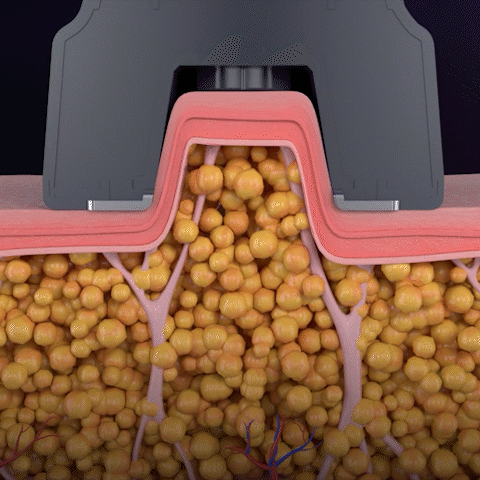
Related Studies
Why 1MHz Bipolar RF?

High frequency energy is more quickly absorbed by the tissue.
Energy absorption also depends on tissue type and water content


Bipolar RF Energy
- Accurate targeting and greater precision in treating specific areas, surface-level treatment.
- Ideal for overall skin revitalization & textural issues such as open pores.
- Immediate Visible Effect
- No Grounding Pad Required → Safer and more convenient for both clinician and client
Vacuum Enhances Depth and Efficacy
Pulls the skin upward to reduce resistance and deeper RF penetration.
Enhances circulation and drainage, better fat metabolism and healing
Overcoming bipolar RF’s shallow depth limit.

Use Case Studies

Reference:
1.Goldberg, D. J. (2021). Deletion of adipocytes induced by a novel device simultaneously delivering synchronized radiofrequency and hifem: human histological study. Journal of Cosmetics
https://onlinelibrary.wiley.com/doi/full/10.1111/jocd.13970
2.Franco, W., Kothare, A., Ronan, S. J., Grekin, R. C., & McCalmont, T. H. (2010). Hyperthermicinjury to adipocyte cells by selective heating of subcutaneous fat with a novel radiofrequency device: feasibility studies. Lasers in surgery and medicine, 42(5), 361-370.
https://onlinelibrary.wiley.com/doi/abs/10.1002/lsm.20925
3.Goo, B., & Kim, D. S. (2016). impact of Contactless Apoptosis-inducing RF on Temperature of Human Skin Surface and Subcutaneous layer as well as porcine Histology: A pilot Study.Medical Lasers,5(1), 29-33.
How 1MHz Bipolar RF Reduces Fat


.png)

.png)
Target Heating
RF heats subcutaneous fat to 43–45°C and maintains it for optimal duration ( ≥15 min).
Heat-Induced Apoptosis
This controlled heating triggers apoptosis in adipocytes , as confirmed by increased markers such as caspase-3 in treated tissue.
Selective Action
Adipocytes are more heat-sensitive than skin or other tissues
Targeted fat reduction with minimal damage
Reference:
Goldberg, D. J. (2024). Induction of fat apoptosis by a combination of synchronized radiofrequency and HIFEM technology: Human histology study. Journal of Cosmetic Dermatology, 23(3), 812-817. https://onlinelibrary.wiley.com/doi/10.1111/jocd.16197
McDaniel, D., & Lozanova, P. (2015). Human Adipocyte Apoptosis Immediately Following High Frequency Focused Field Radio Frequency: Case Study. Journal of Drugs in Dermatology: JDD, 14(6), 622-623. https://jddonline.com/articles/human-adipocyte-apoptosis-immediately-following-high-frequency-focused-field-radio-frequency-case-st-S1545961615P0622X
Koo, J., Chae, Y., Kim, S. E., Shin, S., Shim, K. M., Jang, K., & Kang, S. S. (2024). Evaluation of Non-invasive Fat Reduction Using a Resistive Electric Transfer-based Radiofrequency Device With Multi-channel Handpieces. in vivo, 38(4), 1750-1757.
https://iv.iiarjournals.org/content/38/4/1750
Vale, A. L., Pereira, A. S., Morais, A., Noites, A., Mendonça, A. C., Martins Pinto, J., ... & Carvalho, P. (2018). Effects of radiofrequency on adipose tissue: A systematic review with meta-analysis. Journal of cosmetic dermatology, 17(5), 703-11. https://core.ac.uk/download/pdf/327019859.pdf
Key RF Properties Leading to Fat Cell Death
FREQUENCY
.png)
Typically above 100 kHz
TEMPERATURE
.png)
Sustained heating to 43–45°C
DURATION
.png)
Both the peak temperature and how long it is maintained are crucial for effective fat cell death (15 min).
Contact Cooling and Subdermal RF Irradiation
1 MHz Bipolar RF With vs. Without Contact Cooling (in vivo minipig study)
With Contact Cooling
Surface Temperature Behavior
Infrared thermography showed that surface temperature rose more slowly and remained lower-cooling was sustained more than 60 seconds after RF delivery.
Histological Outcomes in Dermis
Deep dermal IENT zones were more pronounced and widespread.
Epidermal damage was reduced.
Over time, deeper thermal reactions were stronger and more homogenous compared to uncooled areas
RF with COOLING
Immediate Reaction

Day 3

-
Necrosis occurs deeper in the dermis
-
Epidermis is largely spared
-
Thermal zone is broader & more homogenous
Without Contact Cooling
Surface Temperature Behavior
Surface temperature increased faster and stayed higher
Histological Outcomes in Dermis
Both peri-electrode coagulative necrosis (PECN) and inter-electrode non-necrotic thermal reaction (IENT) zones were observed (granular thermal damage around needles as well as diffuse dermal heating)
RF without COOLING
Immediate Reaction

Day 3

-
Necrosis is closer to the skin surface
-
More epidermal injury
-
Narrow and irregular thermal zone
1. Cho, S. B., Lee, Y. J., Kang, S. Y., Choi, M., Kim, B., & Ahn, J. C. (2024). Effects of Parallel Contact Cooling on Pulsed-Type, Bipolar Radiofrequency-Induced Tissue Reactions in an in vivo Porcine Model. Clinical, Cosmetic and Investigational Dermatology, 125-135.
Advantages of EMS

Induces supramaximal muscle contractions through direct stimulation of neuromuscular pathways
Improves muscle tone, firmness, and volume, while boosting local metabolism and energy consumption

Contributes to fat reduction through the breakdown of triglycerides stored in fat cells to glycerol and free fatty acids

EMS has been shown to produce an average subcutaneous fat reduction of 19.6% and an average muscle thickening of 15.1%
Reference
1. Choi, E. J., Kim, Y. J., & Lee, S. Y. (2018). Effects of electrical muscle stimulation on waist circumference in adults with abdominal obesity: A randomized, double-blind, sham-controlled trial. JNMA: Journal of the Nepal Medical Association, 56(214), 904. https://pmc.ncbi.nlm.nih.gov/articles/PMC8827604/
Clinical Evidence Supporting Fat Reduction Effects of EMS
.png)
EMS 4 mA and 6 mA significantly increased lipolysis by 1.8 and 2.3 times above basal.
Glycerol as the marker of lipolysis was measured
EMS reduced waist circumference (5.2 cm vs 2.9 cm) and increases free fatty acids indicating increased fat mobilization
.png)
.png)
Changes of waist circumference over the 12-week study period
70.0% of the EMS group were found to have lost >4 cm
To learn more, read more from the National Library of Medicine.
Reference
1. Hamida, Z. H., Comtois, A. S., Portmann, M., Boucher, J. P., & Savard, R. (2011). Effect of electrical stimulation on lipolysis of human white adipocytes. Applied Physiology, Nutrition, and Metabolism, 36(2), 271-275.https://pubmed.ncbi.nlm.nih.gov/21609289/
1. Choi, E. J., Kim, Y. J., & Lee, S. Y. (2018). Effects of electrical muscle stimulation on waist circumference in adults with abdominal obesity: A randomized, double-blind, sham-controlled trial. JNMA: Journal of the Nepal Medical Association, 56(214), 904. https://pmc.ncbi.nlm.nih.gov/articles/PMC8827604/

